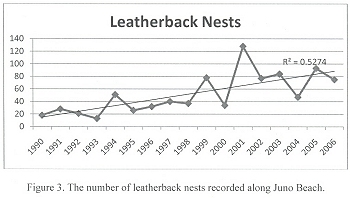Grant: 06-013R
Project Title: Characterizing the FL Leatherback Population
Project Manager: Chris Johnson
Organization: Loggerhead Marinelife Center (Non-Profit Organization)
Grant Amount: $8,925.00
Completion Date: 2009-09-16
Summary: Since 2001, the Marinelife Center of Juno Beach, in collaboration with Kelly Stewart (Duke University PhD candidate), has led a successful leatherback research program on the beaches of Northern Palm Beach County. In the first five years of this long term project we have identified 189 individual females on our beaches, tracked 13 turtles via satellite telemetry and analyzed more than 100 genetic samples. Our project relies heavily on partnerships, collaborations and in-kind donations to effectively carry out our work. Our project is an excellent example of many groups working together toward a common goal. We publish and present results of the project regularly. Our website provides interpretation of our findings and educates the public on the importance of the conservation of leatherback sea turtles. All of our gathered data is made available to education staff at the Marinelife Center and is used regularly in lessons. For the 2006 season, this grant will support the labor costs for the project coordinator and two research assistants. Survey expenses, tagging supplies and telemetry associated costs have already been donated or we will be seeking additional funding sources.  Results: The survey area (Jupiter Inlet to Lake Worth Inlet = 20 km = 12 miles) was patrolled each night from 9 pm to 6 am from March 1 th to June 27th. Total leatherback observations for the 2006 season = 89. Number of individual females = 42. Number of 'new' turtles = 19 (these turtles were untagged when encountered). During the 2006 season, six leatherbacks were fitted with harnesses and satellite transmitters in collaboration with staff from the National Marine Fisheries Service. Four of these transmitters were a new model GPS tag featuring Fastloc technology. These tags perfonned very well in the early part of the season, but failed within the first three months due to battery exhaustion. Future deployments of these types of tags look very promising for detennining nest frequency and site fidelity. We plan to utilize these tags again in 2007. Genetic samples have been collected from all nesting leatherback turtles. These samples have been sent off to Peter Dutton's laboratory in La Jolla for analysis. Results from this work will be presented as soon as they are analyzed. We are very encouraged by the number of leatherbacks nesting along our beach and along the entire Florida coastline. Each season we are encountering more turtles and we are very excited about continuing our work along this important beach. Results from this project will be featured in the chapter "Dennochelys coriacea - Leatherback sea turtle" in Biology and Conservation of Florida Turtles" published under the Chelonian Research Monographs. (Author: Chris Johnson)
Results: The survey area (Jupiter Inlet to Lake Worth Inlet = 20 km = 12 miles) was patrolled each night from 9 pm to 6 am from March 1 th to June 27th. Total leatherback observations for the 2006 season = 89. Number of individual females = 42. Number of 'new' turtles = 19 (these turtles were untagged when encountered). During the 2006 season, six leatherbacks were fitted with harnesses and satellite transmitters in collaboration with staff from the National Marine Fisheries Service. Four of these transmitters were a new model GPS tag featuring Fastloc technology. These tags perfonned very well in the early part of the season, but failed within the first three months due to battery exhaustion. Future deployments of these types of tags look very promising for detennining nest frequency and site fidelity. We plan to utilize these tags again in 2007. Genetic samples have been collected from all nesting leatherback turtles. These samples have been sent off to Peter Dutton's laboratory in La Jolla for analysis. Results from this work will be presented as soon as they are analyzed. We are very encouraged by the number of leatherbacks nesting along our beach and along the entire Florida coastline. Each season we are encountering more turtles and we are very excited about continuing our work along this important beach. Results from this project will be featured in the chapter "Dennochelys coriacea - Leatherback sea turtle" in Biology and Conservation of Florida Turtles" published under the Chelonian Research Monographs. (Author: Chris Johnson)